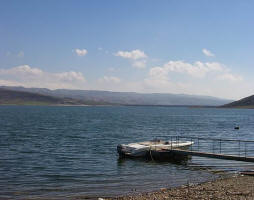- Regional water observation mechanism
- Regional Cooperation Assessment
- Water Quality Monitoring (JP)
- Water scarcity and drought (JP)
- Groundwater (JP)
- Waste water reuse (JP)
- Shared Water Resources Management (JP)
- Linking rural development and water management (JP)
- Waste management
- Water institutions
- Climate Change
- Floods
- Desalination
- Right to Water
- Irrigation
- Satellite data
- Water reports & data
- Hydrology
- Sanitation
- Gender and IWRM
- ArabWAYS
- Non-Revenue Water
- Virtual Water & Water Footprint
- WANA Water Panel
- Water Demand
- Water Governance
- Water Pricing
- Water accounts
- Water nexus Energy
- Geosciences
- Rural Management
 Water rights: The Economist’s take on the water sector
Water rights: The Economist’s take on the water sector
Water does not feature often in The Economist, the world's leading
financial and political magazine. So it is perhaps a sign of the times that
the World Water Forum in Istanbul triggered a leader as well as a long
article [http://www.irc.nl/url/32573] in their April 11 edition.
The headline on their leading (opinion) article shows their take on the
water sector.
* "Water rights: Awash in waste. Tradable usage rights are a good tool
for tackling the world's water problems", as leader.
Two global trends
The Economist article notes the way that water shortages are having
political impact in various countries, and notes that two global trends
have added to accelerating pressure on the world's water resources. The
first is demography. Over the past 50 years, as the world's population
rose from 3 billion to 6.5 billion, water use roughly trebled. The second,
argues The Economist, is the shift from vegetarian diets to meaty ones -
which contributed to the food-price rise of 2007-08 and has big
implications for water, too.
The Economist makes a number of observations that are known to people in
the sector, but which still do not sufficiently influence policy:
* Water is rarely priced in ways that reflect supply and demand.
* Basic information about who uses how much water is lacking.
* The governance of water is also a mess. Until recently, few poor
countries treated it as a scarce resource, nor did they think about how
it would affect their development projects. They took it for granted.
* Alongside this insouciance goes a Balkanised decision-making process,
with numerous overlapping authorities responsible for different
watersheds, sanitation plants and irrigation.
* Not surprisingly, investment in water has been patchy and neglected. Aid
to developing countries for water was flat in real terms between 1990
and 2005.
Unsurprisingly, perhaps, The Economist sees the way forward in terms of
economic systems and claims that business is showing the way. "Big drinks
companies such as Coca Cola have set themselves targets to reduce the
amount of water they use in making their products." (Perhaps it would
have rounded the article to reflect on the fact that Coca Cola has suffered
much adverse publicity worldwide and especially in south-east Asia because
of its perceived overuse of water, to the detriment of local communities.)
Politics, water and rights
In its opinion piece, The Economist wants no part of the "water is a
human right" argument, preferring instead a concept of "usage rights"
that would be traded by farmers and businesses.
"In many places water is becoming scarcer. Treating it as a right makes
the scarcity worse. Some of the world's great rivers no longer reach the
sea. In many cities water is rationed. Droughts and floods are becoming
more extreme. These problems demand policies. Ideally, efficient water use
would be encouraged by charging for it, but attempts to do so have mostly
proved politically impossible. A more practicable alternative is a system
of tradable water-usage rights."
"Usage rights have flaws. At first, they confirm existing patterns of use
that are often inefficient. Farmers can cheat, as Australians have found.
They are, at most, a good start. But they would be better than what exists
now, which is sporadic rationing and the threat of a giant crisis."
Collective answer from the sector?
Economist articles are always sharp and there is no doubt that this edition
makes some telling points, which sector insiders have also made over recent
years. However, the 66 comments from readers reflect the lack of consensus
over how to protect, share and finance water services.
Amongst the comments are the following:
"Charge consumers in the world's cities for what they really use. Its
high time the urban populations of the USA and the UK had water meters
installed. In particular in California and the South-East. And the same
should apply to farmers."
"The right to water is a human right that should not be controlled or
taxed by government. What the government should do, instead of limiting our
use of it, is to promote technology that will help us recapture it and
stimulate the economy. We don't need to pay anyone to tell us to use
less."
"Commodifying water does not make it more available - it means that it is
only available to those that can afford it. And nature, which cannot 'buy'
water, goes without?"
"The way to reconcile the human right to water with water as commodity is
to have ‘some for free, and pay for more'."
"A slippery slope for the vast majority of the world when The Economist
(with its excellent writing) can convince the uneducated poor that water is
not a right. No problem for the lard-asses of the west who feel it their
god given right to eat meat at least three times a day..."
"For people and other animals, air, water, and food are necessities, not
rights."
"The water issue, for once, should be a technology issue than anything
else .... As soon as the situation got worse enough, human beings will
learn how to make water out of sea (unlimited supply) and solar energy
(again unlimited supply).
"Water is not a commodity - a fungible, readily deliverable resource. It
must be viewed as a natural and national heritage, owned by all.
Water trading in Australia has enabled us irrigators to buy up 'sleeper'
and 'dozer' licences, and use water that hadn't been utilised for
decades."
The leader triggered 41 comments. Here is one that sums up part of the
discussion: "This is an understandable position when - water - is viewed
solely as a "commodity" for sale to the highest bidder. When
water is viewed as part of the "commons" tradable usage rights no
longer appear as a "good-tool" for tackling the world's water
problems. In the final analysis it becomes one of perspective and
perception...?"
Argument, anger, confusion - The Economist article, leader and responses
show the way that the water issue raises ethical, political, technological,
managerial and scientific questions. Can the water sector come up with a
collective answer? Source is playing its part and remains willing to
contribute.
Submit your views by e-mail to the editor:
Dick de Jong mailto:jong@irc.nl
| Contact information |
Dick de Jong
(email: jong@irc.nl) |
|---|---|
| News type | Inbrief |
| File link |
http://www.irc.nl/url/32573 |
| Subject(s) | POLICY-WATER POLICY AND WATER MANAGEMENT , RIGHT |
| Geographical coverage | International |
| News date | 20/05/2009 |
| Working language(s) | ENGLISH |
 you are not logged in
you are not logged in





